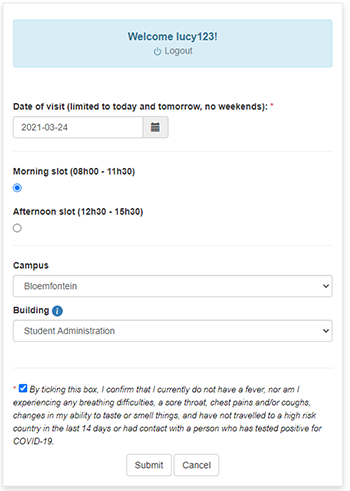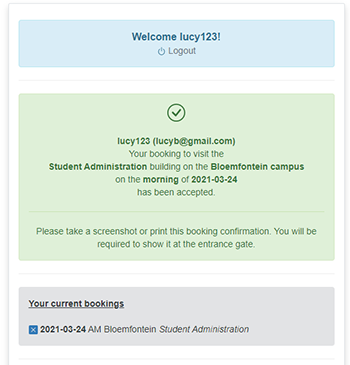News & Events
Student booking app a major success

- Limit access to Unisa campus buildings to the required number by law
- Limit access to buildings according to the maximum number a venue is authorised to take
- Allow departments to monitor activity in buildings
- Allow students to make a booking for a date to a building.
The current app was developed by Professor Mac van der Merwe from the Department of Information Systems in the College of Science, Engineering, and Technology (CSET). Explaining the process and its challenges, Van der Merwe says that the primary goal was to offer, in the shortest time possible, an inexpensive app that firstly ticks all the required boxes as required by Covid-19 regulations, and, secondly, would not require high data usage. Using a web-based app fits the bill by eliminating the need for platform-specific development, updates and recurrent downloads, as well as lengthy app store approval procedures.

In addition, mobile scanners to scan student cards, confirm bookings, and capture body temperatures at campus entrance gates and buildings had to be tested, procured, configured, and distributed. Various other departments were involved, and the role they played in the realisation of the app was key. At the time of writing, close to 73 000 students have registered with over 90 000 bookings made.
An innovation-driven college
CSET is a college that has often driven innovation, design, and the development of bespoke solutions for the university. Professor Bhekie Mamba, Executive Dean of CSET, says: “We as a college lead Unisa into the forefront of technological possibilities. The college management has always encouraged CSET academics to think outside the box, not only in terms of their tuition, but also in terms of their research, academic citizenship, and community engagement. As college management, we are always looking for opportunities to support the university at any given opportunity.”
Mamba explains that the School of Computing in the college has a long history of designing and developing custom-made solutions for the university. Some of these include the postgraduate online examination system, their internal RIMS management system to process and manage the school’s research outputs, a system to automate and manage the school’s internal CRC processes, and the Osprey system, which has been used by the school for many years as an information system to inform fellow staff and students about staff whereabouts.

Mamba adds that CSET is committed to support Unisa on various fronts. “We, through the School of Computing, have played a key role in assisting students and staff to mitigate challenges experienced during last academic year’s sudden fully online exam. CSET provided solutions that made a success of a first-of-kind-exam in the world. I’m proud to say that CSET rose to meet and resolve challenges imposed on the university due to the Covid-19 pandemic. We will continue to advise, assist, and help resolve issues of the larger university community,” he concludes.
How the app works
*By Tshimangadzo Mphaphuli, Senior Journalist, Department of Institutional Advancement
*Lead and teaser graphics adapted from image by OpenClipart-Vectors from Pixabay
Publish date: 2021/03/31

